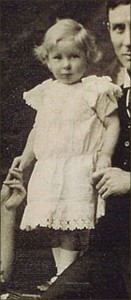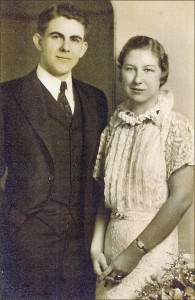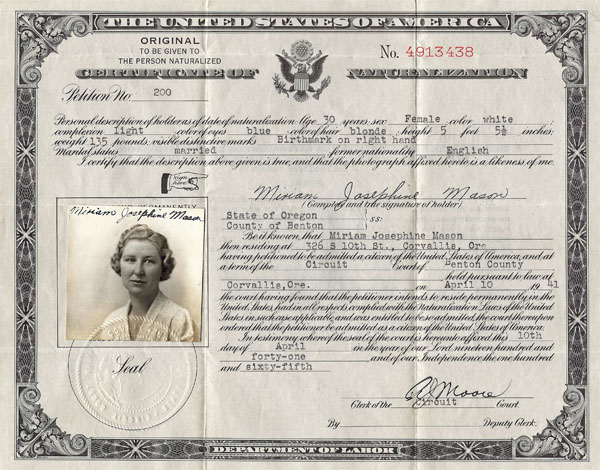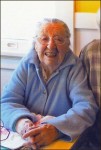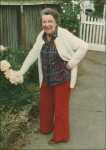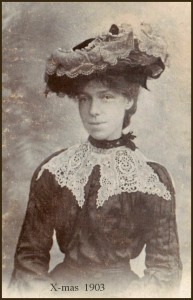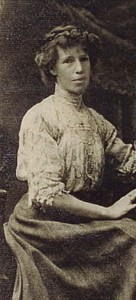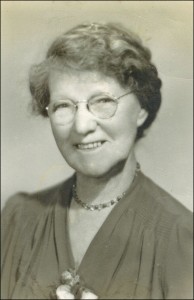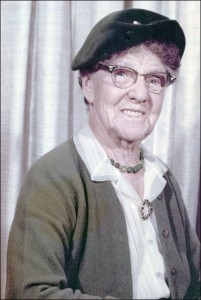No.1 Crooked Billet Wimbledon Common
“Jo” The Home Economist
My mother, Miriam Josephine (Kidd) Mason, was born on August 23, 1910, so at this writing (May 29, 2010), she is very close to the century mark. She may make it and she may not. It will be a near thing. In my extended family she is the last of the previous generation and has lived to see many changes. She was born in South Africa after the Boer War, lived on the Isle of Jersey in her youth, and at No. 1 Crooked Billet, Wimbledon Common, London. She immigrated to the Calgary area of Canada with her mother and two brothers at eleven years of age. The Canada situation turned out to be not as advertised and after a short stay the family relocated again to Oregon. She graduated from Oregon State (College) University in 1934 with a degree in home economics and worked professionally in that field for several years. In 1936 she married my father, Donald Lyman Mason (more here ), and gave birth to me in 1938. Two years later my sister Irene Joyce (Mason) Jenkins was born and in 1942 the new family moved to Palo Alto, Cailfornia where she still resides in the same house.
Mom applied her professional training to running our household and took pride in her work. She was an expert seamstress and made many clothing items for herself and for us kids. Her pies were to die for and fortunately that talent has been passed on to my sister. Like my father, she had a love of poetry and that also has been passed on. All in all she was a good mom and I have many fond memories, especially from when I was young. Below are some stories, in roughly chronological order, that come to mind:
Mom has no memory of South Africa but she does remember Jersey and I have a few of those memories on tape. Her memory of No. 1 Crooked billet is better, and I remember her telling about looking out the window during WWI and seeing the “Iron Cross” on the bottom of the wings of the German planes and hearing the shrapnel from the antiaircraft guns falling on the roof (more here).
The only things I remember Mom saying about the trip to Calgary was that their ship, upon entering the mouth of the St Lawrence River, had to back out again because there was an iceberg lodged there. She also mentioned the trip across Canada on the Canadian Pacific Rail Road. Apparently her mother, Miriam Phoebe (Williams) Kidd, was quite nervous about keeping the family together at various intermediate stops where they detrained to walk about a bit. She didn’t want anybody left behind out there in the middle of nowhere.
We also heard a story about attending school in Canada. Mom still had an English accent and the teacher was from the Bronx of New York City. Even though they both were speaking English they couldn’t understand each other.
A later school story was about her experience while attending classes in Seaside, Oregon after they had entered the USA. First thing in the morning all the students stood to pledge allegiance to the flag. Jo was somewhat bewildered and decided that since she was a British subject she should not do this thing. When asked why she said, “It’s not my flag and I’m not going to salute it.” That seemed to make sense, but later another student’s mother stopped Jo’s mother on the street saying, “Mrs. Kidd I understand that you won’t let your child pledge allegiance to the flag.” That was the first my grandmother had heard about it. Apparently a genuine foreigner was quite a novelty to insular little Seaside.
In Oregon they lived for a short period with relatives in Portland. On one occasion, to earn a little extra money, they signed up to pick strawberries at a farm near the base of Mt. Hood. Jo and her mother picked strawberries all day but toward late afternoon Jo grew tired of the job and wandered off on a path that led into the nearby woods. After she had gone down the path some distance she came to an old abandoned cabin. Jo was curious and went inside to look around. The cabin was empty and it looked as if no one had been there in a long time. In one corner was a cupboard which Jo opened. There was nothing in the cupboard except on one shelf. There, way in the back, was an old egg cup. Jo decided that the egg cup needed a better home so she took it and put it in her pocket. On her way back to the strawberry field she came face to face with a black bear. Jo stood very still and looked at the bear. The bear stood very still and looked at Jo. They looked at each other for a long time. Finally, the bear turned slowly and walked away. When the bear was out of sight Jo ran as fast as she could back to her mother in the strawberry field. Somewhere in the excitement she lost her punch card that told how many baskets of berries she had picked, but the good farmer paid her anyway. The egg cup is now in the possession of my daughter, Deanna Lynne Mason
After graduating from college, Jo was hired by San Joaquin Power and Light with headquarters in Fresno, California. This was in the days of the Rural Electrification Administration, and isolated rural communities and farms were being electrified at a rapid rate. Jo’s job was to go to these outlying areas and demonstrate electrical appliances to those who were unfamiliar with them. It was considered one the best jobs a woman could get in those days. Salesmen from the various electrical appliance manufacturers would chase after her at the end of each day to find out where she had been. Naturally, they would followup in short order. Sometimes they would chase her around personally too and she had some stories to tell about that.
I didn’t realize until just recently that she put off becoming a U.S. Citizen until she was 30 years of age. When she did finally get around to it there were some unanticipated complications. She had a hard time proving she was in the country legally. It seems that when she came down from Canada at about age twelve the border officials listed only her mother’s name and then added the phrase “and child.” Proving that she was that “child” turned out to be something of a task.
Having traveled extensively during her early life, upon reaching Palo Alto during WWII, Jo put down roots. With her children in the local schools and her husband gainfully employed at Stanford University, Jo settled in for the long haul. Just a few years ago I heard her refer to herself as “a stick in the mud.” (click image for larger view)
Miriam Phoebe Kidd
As mentioned in a previous post of this category, My uncle ,George Edwin “Ted” Kidd (GEK), wrote a history of the Kidd family centered around my grandfather William George Kidd (WGK). This is the traditional way of writing a family history in a patriarchal society and he did an excellent job. However, to my way of thinking, the real and central strength of the Kidd family resided in my grandmother Miriam Phoebe (Williams) Kidd (MPK). To use a nautical analogy, she was the one who stepped up to the helm when the Captain died (click here) in the middle of a long voyage and she brought the ship safely into port in excellent fashion. As WGK advised on his death bed, she immigrated to the New World with three children in tow, put them all through college and lived to the ripe old age of ninety-five. All this while blind in one eye since WWI. She traveled extensively in the latter part of her life and drove a car until she was ninety. Since she lived to be more than twice the age of her husband when he died there is much to cover, and if I were to go into the same level of detail as did GEK it simply would not fit into a blog format. In addition, my other uncle, Herbert Arthur Wilson “Bert” Kidd (HAWK), has already produced a detailed piece based on MPK’s own records together with his recollections. Consequently, I will simply add some of my own recollections, as well as those of my sister Irene Joyce (Mason) Jenkins (IJJ) and others who knew her well.
My sister and I probably had more in-depth exposure to MPK than anyone else of our generation in the Kidd family. Primarily because MPK lived within forty miles of us while we were growing up. She was a frequent visitor to our home and we were frequent visitors to hers. Often in the summer when school was out one of us would be deposited in Santa Cruz to spend up to a week with “Grandma Kidd.” It was on these occassions that we often heard stories of her life, and what an interesting life it was.
One story that I don’t find covered by either of my uncles is how she lost the sight of her left eye. It happened during WWI when MPK and my mother, Miriam Josephine “Jo” (Kidd) Mason (MJM), lived at No. 1 Crooked Billet, Wimbledon Common, London, England. One night when a blackout was in force MPK was returning home with some items purchased at a local grocer. Jo answered the knock on the apartment door and unlocked it to find MPK with blood gushing from a severe cut on her forehead and streaming down her face and front. Needless to say, this made quite an impression on my mother who was nine or ten at the time. According to MPK she had run into a lamp post or pole of some kind because of the darkness. I still don’t understand how, but because of this blow she lost the sight of her left eye. Much later in life, that eye gave her more trouble and it was replaced with a glass eye. So, despite the fact that GEK gives much space to things military in his memoirs, i.e. the Boer War and WWI, “Mum” seems to be the only one of the family to have actually suffered a casualty as the result of war and that fact goes unmentioned. Losing the sight of her left eye was just one of many hardships that MPK worked through, and in spite of it she drove a 1937 Plymouth until she and the car were both quite elderly.
The burdens of responsibility fell very early on the young MPK. As HAWK points out: “MPK’s mother had rheumatic fever in her youth and was never a strong person. She died in 1892 when MPK was sixteen. . . MPK’s father employed a maid and a washerwomen (laundress). Neverthelesss, MPK carried a great deal of the responsibility for the four children from about 12 to 4 years old. She did much of the shopping for food. . . She left school when she was 14 because of her mother’s steadily deteriorating health. Her mother taught her how to cook and care for a household. Her father who was very hot-tempered had little patience with MPK’s mistakes. . . MPK kept house for her father for eight years after her mother died.” Because of this early experience MPK seems to have been almost “trained” for events that overtook her later in life.
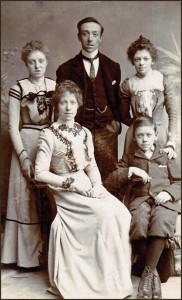
MPK was formally trained as a nurse and she worked at this profession at various times during her life. She also worked in retail sales from time to time, but her specialty was running boarding houses for paying guests. This is something she did on numerous occassions widely separated in time an place. From all that I have heard, she did this with a fair amount of success and a lot of hard work.
Much much later in life, after MPK’s children were all schooled, employed and married MPK settled in Santa Cruz, California and her life began to level out to “smooth sailing.” She quite enjoyed independent living and traveling. I remember her saying, some time in her eighties, that she felt that the last twenty years of her life must have been a reward for all the hard work she had done earlier. During that time she had many friends and socialized a great deal. To read about something that happened on one such occasion, click here.
Here are some memories at random:
I remember once as a small boy who had recently learned of the pilgrims coming to America, asking my Grandma if she had come over on the MAYFLOWER. That brought a hearty laugh and she said, “No but you can tell your friends that I once came over on the QUEEN MARY.” Many years later I attended a convention of port authorities aboard the QUEEN MARY which by then was permanently docked at the Port of Long Beach. I wandered about the old ship wondering how many times my path crossed tracks made by MPK many years ago.
My friend (and ex-wife) Lynne Dotson recently reminded me that: MPK used to keep a pot of stew on her stove,”in case someone should stop by.” Every day she would add something to it and bring it to a boil. It didn’t look very good but it was always quite tasty.
Even at a fairly advanced age MPK was a walker. She could hike long distances without seeming to tire. Once when I was staying at her place she suggested we go for a walk. We ended up hiking all the way to Capitola and back, a distance of perhaps eight miles round trip. At the end I, an early teenager, was completely bushed and she was still going strong.
Here is a memory from sister Irene: “I frequently tell the story of she and I going to a movie in Palo Alto shortly after she got her glass eye. She rubbed her eye and the glass eye fell on the floor and we couldn’t find it. I had to go for a usher and asked to borrow his flash light because my Grandmother had lost “something“. It was early teen or pre teen embarasment. Luckily she found it before I got back with the usher.”
Here is a contribution by my cousin Phil Kidd: “One time when we were living in Ridgewood, Ted hung up chuckling after talking to Grandmother. Being curious, I asked him what’s so funny? He laughingly said your Grandmother was telling me how she had to scold her neighbors. She said the ‘old biddies’ were out in the wind without shawls or anything on their heads. Ted had asked her: ‘Do you wear a shawl or anything when it’s windy?’ She indignantly replied: ‘Of course not, I am not that old.’
Not seeing the point, I asked: ‘What’s so funny about that?’ Ted smiling looked at me and said: ‘Phil, your Grandmother is in her 80s and at least 10 years older than those ‘old biddies’ I always took that as an indication of Grandmother’s youthful outlook on life and her indomitable spirit.”
Categories
- THE GALLERY
- Uncle Rob's Art
- 3D Works (stills) I
- 3D Works (stills) II
- 3D Works (stills) III
- 3D Works (video)
- Design & Abstract I
- Design & Abstract II
- Design & Abstract III
- Figurative Works I
- Figurative Works II
- Landscapes I
- Landscapes II
- Largest Art Project
- Nautical and Marine Images (video)
- Nautical and Marine Images I
- Nautical and Marine Images II
- Nautical and Marine Images III
- Nautical and Marine Images IV
- Portraits
- Still Life Images
- Stump Hollow Photo Essay I
- Stump Hollow Photo Essay II
- Uncle Rob's Mendocino Shop
- The Five Sense Series
- Irene's Creations
- Works by Don Mason
- Works by Don Mason II
- Works by Joseph de Borde
- Painting by Albert Robbins
- Art by Leslie Masters Villani
- Paintings by Nellie Harriet Parker
- The Art of Bee Yearian
- Works by Evie Wilson
- Uncle Rob's Art
- SCHOONER MOON BOOKS
- SEA STORIES
- ONE DOZEN AND TWO ESSAYS
- Cousinhood
- Art by Definition
- Cake Mixed Economy
- Marriage Anyone?
- Sex and/or Violence
- Searching for Truth
- The Philosophical Roots of Science
- Stepping Stones and Stumbling Blocks
- On Being Good
- Teaching By Example
- The Basic Law of Civilization
- Where Goeth Evil?
- A Modern Empircal "Religion"
- Knowledge as Wealth
- PAPERS AND ARTICLES
- FAMILY STORIES
- BOOK REVIEWS
Archive
- December 2021
- October 2020
- June 2020
- September 2019
- July 2017
- March 2017
- December 2016
- November 2016
- October 2016
- August 2016
- July 2016
- June 2016
- May 2016
- March 2016
- February 2016
- February 2015
- January 2015
- February 2014
- December 2013
- November 2013
- August 2013
- June 2013
- August 2012
- July 2012
- April 2012
- March 2012
- February 2012
- November 2011
- September 2011
- June 2011
- May 2011
- April 2011
- March 2011
- February 2011
- January 2011
- December 2010
- November 2010
- October 2010
- September 2010
- August 2010
- July 2010
- June 2010
- May 2010
- April 2010
- March 2010
- February 2010
- January 2010
- December 2009
- November 2009
- October 2009
- September 2009
- August 2009
- July 2009
- June 2009
- May 2009
- April 2009
- March 2009
- February 2009
- January 2009
- December 2008
- November 2008
- October 2008
- September 2008
